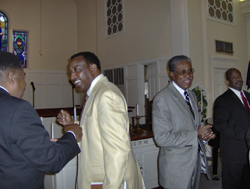At long last, the Rev. James Thomas has come home.
As successive calls in ministry moved him ever farther from both his native Southeast and his roots in the parish, Thomas was able to reclaim his first love by returning here to serve a small, African-American congregation in a vulnerable urban neighborhood. Having retired in January 2007 from his position as associate director for Evangelism and Witness for the General Assembly Mission Council of the Presbyterian Church (U.S.A.) in Louisville, Ky., Thomas moved back to Charlotte, where he had previously served the Presbytery of Charlotte as associate general presbyter responsible for new churches, church growth and church redevelopment.
"Parish ministry was my original covenant with the Lord," Thomas said. "I began in a small church in Augusta, Georgia, and was then challenged with each move to take on increasingly larger congregations and administrative positions. Now I’m back in the small church, where I always felt called."
Thomas said that he answered the call in January 2008 to serve as stated supply of the Clanton Presbyterian Church shortly after having bumped into an elder whom he knew from his Charlotte Presbytery days while shopping at a local home improvement store. Thomas called their meeting providential.
"When he asked me what I was doing and found out that I was no longer in Louisville, he asked if I would be a guest minister," Thomas recalled. "Soon afterwards, we both felt the call."
According to the Rev. Marcia Myers, director of the Office of Vocation for the Presbyterian Church (U.S.A.), the U.S. landscape is dotted with small Presbyterian churches in need of leadership and inspiration. "Almost half of our churches have no installed pastor and about 15% have no pastoral leader at all," said Myers. "Because presbytery leaders are unable to find pastoral candidates willing to serve part-time or in challenging urban or rural contexts, the churches continue to decline.
It is a blessing to the PC(USA) when experienced leaders like James Thomas are willing to serve small congregations."
Because Thomas was at a time in his life where he acknowledged that he did not have the same family and financial concerns faced by many of today’s seminarians, he was open to answer God’s call to serve a small, urban, racial-ethnic congregation, thereby hoping to reverse the current statistics of decline across the PC(USA).
"The critical question for the future is how we as a denomination will provide gifted, skilled leadership to our congregations, most of which are small and struggling," Thomas said. "We need to begin to identify resources to subsidize these calls."
Thomas said that he was drawn to the socially-conscious Clanton church, which began its life as a faithful remnant of the former South Tryon Presbyterian Church, which had relocated to another part of Charlotte in 1991 in order to expand. A small group from the South Tryon church chose to remain as a new church development in the same community where its members had served for nearly half a century. The congregation was chartered in 1993.
"Because this is an area with a lower economic base and people primarily in lower income housing, the congregation from the beginning has been very committed and called to ministry and mission in this neighborhood," Thomas said.
The Clanton church acquired its new name and current location when Charlotte Presbytery granted the new church development permission to use the sanctuary of the former Clanton Memorial Presbyterian Church. The word "Memorial" was dropped just prior to the church's chartering service.
"Because Clanton Memorial was an Anglo congregation, it was important that the new church have its own identity in the community," Thomas explained. "Since African-American pastors must be pastors not only to our own parishioners but also to the community at large, the name of the congregation was significant."

A women’s event at Clanton Presbyterian Church.
Today, Clanton’s approximately 130 active members operate a critical outreach ministry in the neighborhood, running a food pantry, a clothing bank, a health ministry, a computer lab, and a tutoring program alongside traditional church programming such as Sunday school and Vacation Bible School.
"When I started, there were hardly any children at the church between the ages of two and eight," Thomas said. "Now we have over 35 kids." During Thomas' first year as pastor, the church welcomed 23 new members.
"Members have begun to come back due to the consistent leadership," Thomas said.
Since his return to the parish, Thomas has followed with interest the church-wide initiative to Grow Christ's Church Deep and Wide. "This is a unique congregation that is very much Afro-centric in its orientation, but it is also very open and inclusive," Thomas said. "Our goal is to become a fully diverse congregation and we are working very hard towards that."
To that end, Thomas said that the congregation needs to start empowering its members with the Spanish language in order to foster effective communication and outreach with the increasing number of Hispanic residents in the community. Recently the church hosted a well attended ESL program.
"I'm really energized by this congregation and their level of commitment," Thomas said. "Together we’re meeting the challenges and struggling to become all that we can become."

